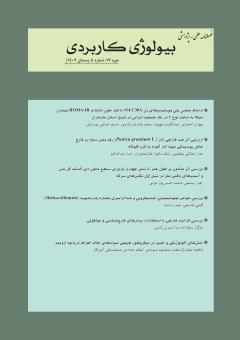بررسی خواص فیتوشیمیایی، ضدمیکروبی و ضدآلزایمری عصاره بادرنجبویه (Melissa officinalis)
محورهای موضوعی : بیوشیمی
گیتی قاسمی
1
,
امیر آراسته
2
*
![]()
1 - کارشناسی ارشد، گروه زیستشناسی، واحد رشت، دانشگاه آزاد اسلامی، رشت، ایران
2 - استادیار، گروه زیستشناسی، واحد رشت، دانشگاه آزاد اسلامی، رشت، ایران
کلید واژه: Melissa officinalis, فیتوشیمیایی, آمیلوئید, آلزایمر, بادرنجبویه.,
چکیده مقاله :
هدف: بادرنجبویه (Melissa officinalis) یکی از مهمترین گیاهان دارویی و از خانواده نعناعیان است که بهعنوان یک داروی افزایشدهنده حافظه شناخته میشود. هدف این مطالعه بررسی ترکیبات موثره، اثرات ضدمیکروبی و اثرات مهارکنندگی عصاره هیدروالکلی بادرنجبویه برای تولید نانو رشتههای آمیلوئیدی بهعنوان یک عامل موثر در بیماری آلزایمر بوده است.
مواد و روشها: ترکیبات موثره گیاه بادرنجبویه با روش گاز کروماتوگرافی جرمی بررسی شد. اثرات ضدمیکروبی روی دو باکتری اشریشیاکلی و استافیلوکوکوس اورئوس با روش چاهک بررسی شده و مقادیر حداقل غلظت مهاری و حداقل غلظت باکتریکشی تعیین گردید. اثرات مهارکنندگی عصاره بادرنجبویه بر فیبریلاسیون آلبومین سرم گاوی با روش جذبسنجی کنگورد بررسی شد.
یافتهها: حضور ماده موثره پیرولیدینون با احتمال حضور 90% تایید شد. قطر هاله عدم رشد عصاره هیدروالکلی بادرنجبویه برای استافیلوکوکوس اورئوس و اشریشیا کلی به ترتیب 20 و 17 میلیمتر و مقادیر MIC و MBC به ترتیب 137/0 و 068/0 و 068/0 و 068/0 گرم بر میلیلیتر بهدست آمد. بیشترین مهار نانو رشتههای آمیلوئیدی در غلظت 4 میلیگرم بر میلیلیتر از عصاره بادرنجبویه مشاهده شد.
نتیجهگیری: عصاره بادرنجبویه با اثرات ضدمیکروبی مناسب و عوارض و هزینه کمتری نسبت به سایر داروهای سنتزی میتواند اثر مناسبی در برابر عوامل عفونتزا داشته باشد. عصاره بادرنجبویه با مهار تولید نانو رشتههای آمیلوئیدی میتواند برای کاهش عوارض بیماری آلزایمر مفید باشد.
Objective: Lemon balm (Melissa officinalis) is one of the most important medicinal plants and belongs to the mint family, which is known as a medicine that increases memory. The purpose of this study was to investigate the effective compounds, anti-microbial effects and inhibitory effects of hydroalcoholic extract of lemon balm for the production of amyloid nanofibers as an effective agent in Alzheimer's disease.
Materials and methods: The effective compounds of lemo balm plant were investigated by gas chromatography-mass spectrometry. Antimicrobial effects on two bacteria Escherichia coli and Staphylococcus aureus were investigated by well method and the values of minimum inhibitory concentration and minimum bactericidal concentration were determined. The inhibitory effects of lemon balm extract on the fibrillation of bovine serum albumin were investigated by Concord absorbance method.
Findings: The presence of the active substance pyrrolidinone was confirmed with a probability of 90%. The diameter of the halo of non-growth of hydroalcoholic lemon balm extract for Staphylococcus aureus and Escherichia coli was 20 and 17 mm, respectively, and the MIC and MBC values were 0.137, 0.068, 0.068, and 0.068 g/ml, respectively. Liter was obtained. The maximum inhibition of amyloid nanofibers was observed at a concentration of 4 mg/ml of lemon balm extract.
Conclusion: lemon balm extract with proper antimicrobial effects and lower side effects and cost than other synthetic drugs can have a good effect against infectious agents. By inhibiting the production of amyloid nanofibers, lemon balm extract can be useful for reducing the complications of Alzheimer's disease.
1. Iadanza MG, Jackson MP, Hewitt EW, Ranson NA & Radford SE. A new era for understanding amyloid structures and disease. Nature Reviews Molecular Cell Biology. 2018; 19(12): 755-73.
2. Ugboko HU, Nwinyi OC, Oranusi SU, Fatoki TH & Omonhinmin CA. Antimicrobial importance of medicinal plants in Nigeria. The Scientific World Journal. 2020; 1: 705-716
3. Jabborova D, Davranov K & Egamberdieva D. Antibacterial, antifungal, and antiviral properties of medical plants. Medically Important Plant Biomes: Source of Secondary Metabolites. 2019: 51-65. DOI: 10.1007/978-981-13-9566-6_3
4. Carvalho F, Duarte AP & Ferreira S. Antimicrobial activity of Melissa officinalis and its potential use in food preservation. Food Bioscience. 2021; 44: 101437.
5. Sepand M, Soodi M, Soleimani M & Hajimehdipoor H. Protective effects of Melissa officinalis extract against beta-amyloid-induced oxidative stress in PC12 cells. Journal of Medicinal Plants. 2012; 2(42): 74-85.
6. Serra E, Saubade F, Ligorio C, Whitehead K, Sloan A, Williams DW & et al. Methylcellulose hydrogel with Melissa officinalis essential oil as a potential treatment for oral candidiasis. Microorganisms. 2020; 8(2): 215.
7. Spadaccino G, Frabboni L, Petruzzi F, Disciglio G, Mentana A, Nardiello D & et al. Essential oil characterization of Prunus spinosa L., Salvia officinalis L., Eucalyptus globulus L., Melissa officinalis L. and Mentha x piperita L. by a volatolomic approach. Journal of Pharmaceutical and Biomedical Analysis. 2021; 202: 114167.
8. Abdel-Naime W, Fahim J, Fouad M & Kamel M. Antibacterial, antifungal, and GC–MS studies of Melissa officinalis. South African Journal of Botany. 2019; 124: 228-34.
9. Borgheei S, Sarikhani H, Chaichi M & Kashi A. In vitro induction of polyploidy in lemon balm (Melissa officinalis L.). Iranian Journal of Medicinal and Aromatic Plants. 2010; 3(26): 7-15. [in persian]
10. Arasteh A, Rezaei MH, Habibi AE & Ali AMM. Bovine serum albumin aggregation: An optimizing approach. Clinical Biochemistry. 2011; 44(13): S136-S7.
11. Norouzi M, Soleimani T & Zanousi MP. Essential oil component in leaf and flower of Lemon balm (Melissa officinalis L.). Research in Pharmaceutical Sciences. 2012; 7(5): 749.
12. Moradkhani H, Sargsyan E, Bibak H, Naseri B, Sadat-Hosseini M, Fayazi-Barjin A & et al. Melissa officinalis L., a valuable medicine plant: A review. Journal of Medicinal Plants Research. 2010; 4(25): 2753-9.[in persian]
13. Mahmodi R, Amini K, Asadi Dashbolagh J & Farhoodi A. Antioxidant and antibacterial properties of Melissa officinalis essential oil. J Qazvin Univ Med Sci. 2016; 20(2): 49-57.
14. Schnitzler P, Schuhmacher A, Astani A & Reichling J. Melissa officinalis oil affects infectivity of enveloped herpesviruses. Phytomedicine. 2008; 15(9): 734-40.
15. Ehsani A, Alizadeh O, Hashemi M, Afshari A & Aminzare M (ed.). Phytochemical, antioxidant and antibacterial properties of Melissa officinalis and Dracocephalum moldavica essential oils. Veterinary Research Forum; Faculty of Veterinary Medicine, Urmia University, Urmia, Iran, 2017. [in persian]

